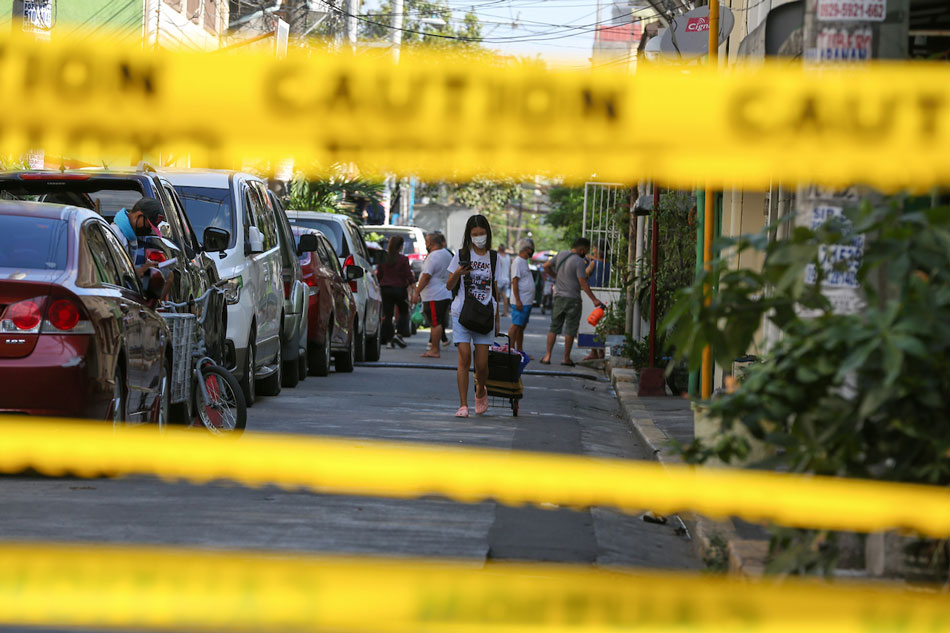Spread of COVID-19 in PH slows down after Metro Manila lockdown: OCTA | ABS-CBN

Welcome, Kapamilya! We use cookies to improve your browsing experience. Continuing to use this site means you agree to our use of cookies. Tell me more!
Spread of COVID-19 in PH slows down after Metro Manila lockdown: OCTA
Spread of COVID-19 in PH slows down after Metro Manila lockdown: OCTA
ABS-CBN News
Published Apr 02, 2021 06:43 PM PHT
MANILA - The rate of increase of COVID-19 cases in the Philippines has decreased after Metro Manila and nearby areas were placed on a lockdown, the OCTA Research Group said Friday.
MANILA - The rate of increase of COVID-19 cases in the Philippines has decreased after Metro Manila and nearby areas were placed on a lockdown, the OCTA Research Group said Friday.
While the average number of new COVID-19 cases reported per
day in Metro Manila increased by 19 percent from March 25 to April 1, it is "much lower compared to previous weekly increases of 60 percent," the group said in its recent bulletin.
While the average number of new COVID-19 cases reported per
day in Metro Manila increased by 19 percent from March 25 to April 1, it is "much lower compared to previous weekly increases of 60 percent," the group said in its recent bulletin.
"The growth rate in the number of new COVID-19 cases per week decreased," it said.
"The growth rate in the number of new COVID-19 cases per week decreased," it said.
"The ECQ (Enhanced Community Quarantine) had a greater effect in reducing the reproduction number compared to the GCQ (General Community Quarantine)," it said.
"The ECQ (Enhanced Community Quarantine) had a greater effect in reducing the reproduction number compared to the GCQ (General Community Quarantine)," it said.
ADVERTISEMENT
Earlier this month, President Rodrigo Duterte re-imposed a lockdown in the capital region after a surge of new COVID-19 cases was recorded a year after the virus was first detected in the Philippines.
Earlier this month, President Rodrigo Duterte re-imposed a lockdown in the capital region after a surge of new COVID-19 cases was recorded a year after the virus was first detected in the Philippines.
The decline in recent days may also be "attributed in part to reduced
testing," the group said.
The decline in recent days may also be "attributed in part to reduced
testing," the group said.
The national government earlier allowed the use of antigen tests to determine if a person is a carrier of COVID-19, but experts warned that this kind of testing usually fails to detect the virus in asymptomatic patients.
The national government earlier allowed the use of antigen tests to determine if a person is a carrier of COVID-19, but experts warned that this kind of testing usually fails to detect the virus in asymptomatic patients.
"There is a need to further scale up PCR testing to be able to keep up with the surge in new COVID-19 cases," the research group said, noting that Metro Manila remains to be the epicenter of the pandemic in the Philippines.
"There is a need to further scale up PCR testing to be able to keep up with the surge in new COVID-19 cases," the research group said, noting that Metro Manila remains to be the epicenter of the pandemic in the Philippines.
As of April 2, the Philippines recorded 15,310 new COVID-19 cases, another record-high number allegedly due to delays in the reporting of new patients.
As of April 2, the Philippines recorded 15,310 new COVID-19 cases, another record-high number allegedly due to delays in the reporting of new patients.
ADVERTISEMENT
ADVERTISEMENT


